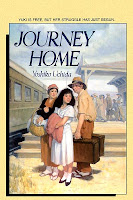 I am sorry to report that this author died in 1992. Uchida has a large body of work, some of it biographical. Her family spent time in the Topaz internment camp during World War II, and Journey Home (1978) is somewhat autobiographical, since it follows some of the same paths that Uchida's family's own experiences did. Yuki's family has been released from Topaz, but instead of returning to California, they must live in Salt Lake City, because anyone of Japanese descent is forbidden to live on the west coast. Eventually, they are able to move back to their own home town and work, along with other Japanese Americans, to rebuild their lives. This was especially interesting, since there are some books about the internment camps, but I have read nothing about the aftermath.
I am sorry to report that this author died in 1992. Uchida has a large body of work, some of it biographical. Her family spent time in the Topaz internment camp during World War II, and Journey Home (1978) is somewhat autobiographical, since it follows some of the same paths that Uchida's family's own experiences did. Yuki's family has been released from Topaz, but instead of returning to California, they must live in Salt Lake City, because anyone of Japanese descent is forbidden to live on the west coast. Eventually, they are able to move back to their own home town and work, along with other Japanese Americans, to rebuild their lives. This was especially interesting, since there are some books about the internment camps, but I have read nothing about the aftermath.Below follows the books that I have in my library on this topic, which is a very good one to add to the study of World War II. Cynthia Leitich Smith has a much better list at
http://www.cynthialeitichsmith.com/lit_resources/diversity/asian_am/japanese_am/nihon_WWII.html
Denenberg, Barry. The Journal of Ben Uchida: Citizen 13559 Mirror Lake Internment Camp (1999)
Garrigue, Sheila The Eternal Spring of Mr. Ito (1999?)
Houston, Jeanne Wakatsuki. Farewell to Manazar (1974)
Kadohata, Cynthia. Weedflower (2006)
Otsuka, Julie. When the Emperor Was Divine (2002)
More resources are available at:
http://www.children-of-the-camps.org/resources/books.html
Wow, so this is like a sequel to Journey to Topaz! I really want to read this.b
ReplyDeleteI read a book in the past year, Tallgrass, which is a fictional Japanese internment camp adult book. The camp in the book is fictional. There are some situational themes that make it more adult (rape, murder, lying, language, maybe), but I'm not remembering anything too objectionable about the book. I've read worse teen/ya books. Maybe something you might wish to look into some day -- it did give a great feel for the topic and was well researched. The introduction, if I'm remembering correctly, tries to correlate the anti-Japanese feeling of the 1940s to the anti-Muslim feeling of the 9/11 aftermath (and she of course has to get in her "I hate President Bush" jab). But otherwise, I liked the book. ;-)
ReplyDelete